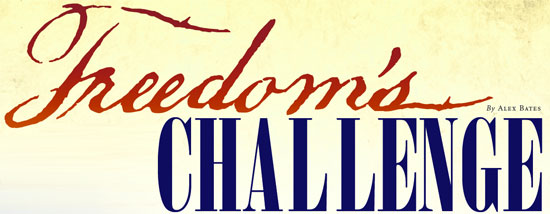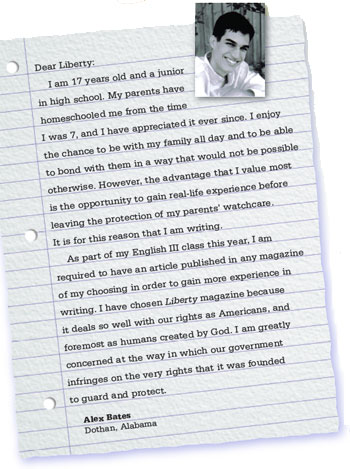Freedom Challenge
Alex Bates July/August 2007
Getting your Trinity Audio player ready...


One of the great things about our Constitution is that it provides us with a variety of options if the government steps outside of its jurisdiction. We have the option of calling or writing to our representatives and addressing the issues with them personally. We are also given the right to lead protests against legislation that is outside of the government's jurisdiction. We are even allowed to go so far as to remove those in office and elect to office those candidates who will better uphold our rights and freedoms and not step outside of the government's authority. Under the Constitution, we are allowed and even exhorted to use any combination of these methods in heeding freedom's challenge to protect the God-given rights that have been so effectively set forth in our Constitution.
Before one can exercise his Consti-tutional rights, however, he must first know what they consist of. We must know to what extent the government's powers extend, and where our rights lie. This is accomplished through a thorough study of the Constitution itself. John Jay, the first chief justice of the Supreme Court, said that "every member of the State ought diligently to read and study the constitution of his country." But studying the Constitution for ourselves is not enough; we must instruct our descendants as well, for they are the next presidents, senators, representatives, and justices. In order to protect the rights set forth in the Constitution, we must educate ourselves and our posterity of its contents.
Alexander Hamilton said that the reason government is instituted at all is that "men will not conform to the dictates of reason and justice, without constraint." Our form of government is a fine balance of governmental restraint and self-government. If we lack self-government, the outside authorities will lay a heavier hand on our liberties and rights. Thus, the more we govern ourselves and our passions, the less the government will impose restraints in our place. Self-government is essential for our form of government to survive and work according to the plan set forth in the Constitution.
This is the challenge that comes with being the proprietor of the liberties outlined in the Constitution and the Bill of Rights. It is our responsibility to guard and protect those liberties that we have been guaranteed. The Constitution provides us with, and even exhorts us to use, those solutions outlined for upholding these liberties. However, we cannot use these methods unless we know what they are, and this can be achieved only through the study of our Constitution. Finally, our system of government is effective only if we govern ourselves and ensure that we are living according to the dictates of reason and justice. Freedom is challenging us—the possessors of these liberties outlined in the Constitution—to protect them for ourselves and our posterity by following the methods provided in the Constitution, educating ourselves and our descendants regarding the Constitution, and by upholding the system of government through self-restraints of our passions. Will you heed freedom's challenge?
Alex Bates (17) is a homeschooled junior in high school. He lives in Dothan, Alabama, with his parents and three siblings.